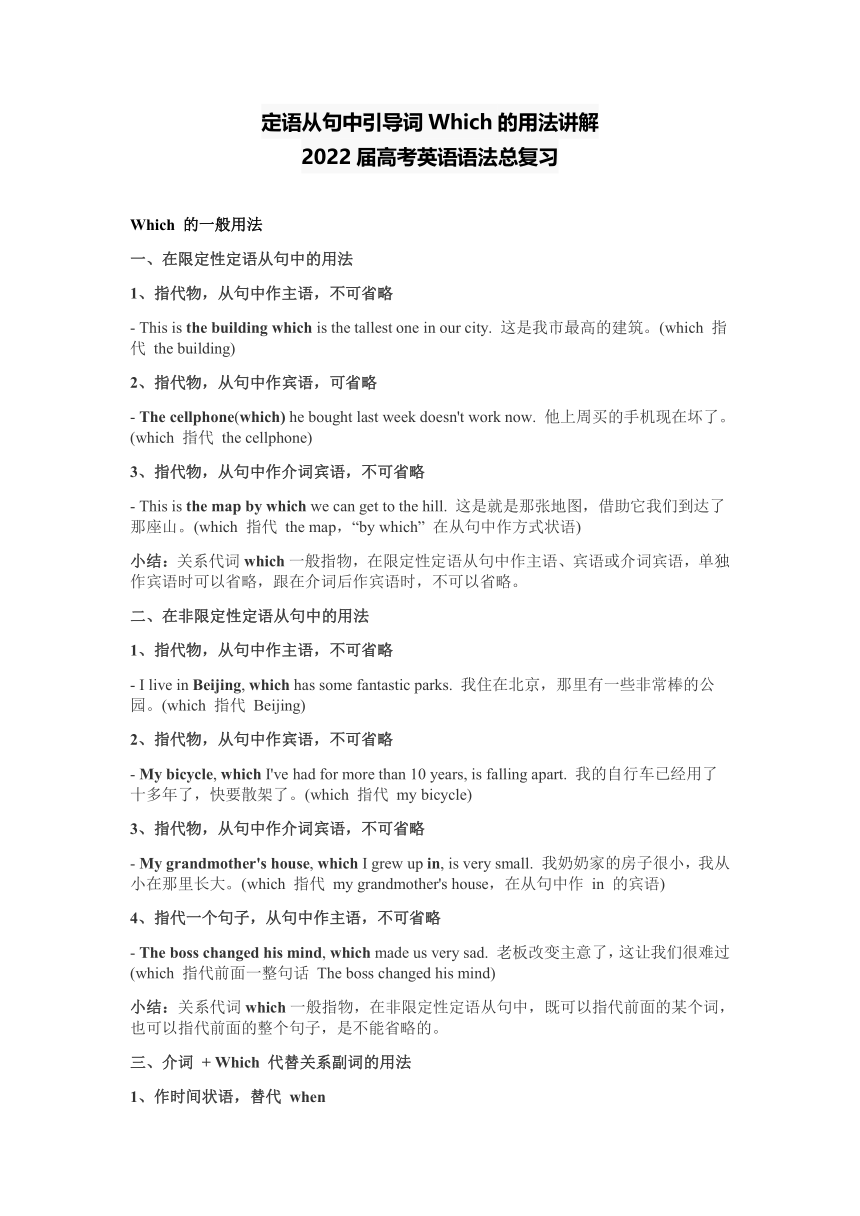2022届高考英语二轮复习:定语从句中引导词Which的用法讲解- 学案(含答案)
文档属性
| 名称 | 2022届高考英语二轮复习:定语从句中引导词Which的用法讲解- 学案(含答案) |

|
|
| 格式 | doc | ||
| 文件大小 | 32.5KB | ||
| 资源类型 | 教案 | ||
| 版本资源 | 通用版 | ||
| 科目 | 英语 | ||
| 更新时间 | 2021-11-26 00:00:00 | ||
图片预览

文档简介
定语从句中引导词Which的用法讲解
2022届高考英语语法总复习
Which 的一般用法
一、在限定性定语从句中的用法
1、指代物,从句中作主语,不可省略
- This is the building which is the tallest one in our city. 这是我市最高的建筑。(which 指代 the building)
2、指代物,从句中作宾语,可省略
- The cellphone(which) he bought last week doesn't work now. 他上周买的手机现在坏了。(which 指代 the cellphone)
3、指代物,从句中作介词宾语,不可省略
- This is the map by which we can get to the hill. 这是就是那张地图,借助它我们到达了那座山。(which 指代 the map,“by which” 在从句中作方式状语)
小结:关系代词 which一般指物,在限定性定语从句中作主语、宾语或介词宾语,单独作宾语时可以省略,跟在介词后作宾语时,不可以省略。
二、在非限定性定语从句中的用法
1、指代物,从句中作主语,不可省略
- I live in Beijing, which has some fantastic parks. 我住在北京,那里有一些非常棒的公园。(which 指代 Beijing)
2、指代物,从句中作宾语,不可省略
- My bicycle, which I've had for more than 10 years, is falling apart. 我的自行车已经用了十多年了,快要散架了。(which 指代 my bicycle)
3、指代物,从句中作介词宾语,不可省略
- My grandmother's house, which I grew up in, is very small. 我奶奶家的房子很小,我从小在那里长大。(which 指代 my grandmother's house,在从句中作 in 的宾语)
4、指代一个句子,从句中作主语,不可省略
- The boss changed his mind, which made us very sad. 老板改变主意了,这让我们很难过(which 指代前面一整句话 The boss changed his mind)
小结:关系代词 which一般指物,在非限定性定语从句中,既可以指代前面的某个词,也可以指代前面的整个句子,是不能省略的。
三、介词 + Which 代替关系副词的用法
1、作时间状语,替代 when
下面 2 句话一个意思,都是“我永远忘不了我儿子出生的那一天”,只不过关系词不一样,用 on which代替了 when
- I'll never forget the day when my son was born.
- I'll never forget the day on which my son was born.
2、作地点状语,替代 where
下面 2 句话一个意思,都是“我在巴塞罗那遇到我妻子的那家酒吧还在那里”,只不过关系词不一样,用 in which代替了 where
- The bar in Barcelona where I met my wife is still there.
- The bar in Barcelona in which I met my wife is still there.
3、作原因状语,替代 why
下面 2 句话一个意思,都是“我想请你解释一下拒绝我帮助的原因”,只不过关系词不一样,用 for which代替了 why
- I'd like you to explain the reason why you refused my offer.
- I'd like you to explain the reason for which you refused my offer.
小结:大部分情况下,在定语从句中都可以用“介词+which”的形式来代替关系副词where, when或why。
只能用 which 的情况
1、在“介词+关系代词” 结构中时
- This is the solution about which we've had so much discussion. 这就是我们一直在讨论的解决方案
2、引导非限定性定语从句时
- He couldn’t read, which surprised me. 他不识字,这让我很吃惊。
3、一个句子中有两个定语从句时,为避免重复,一个用that,另一个宜用which
- Let me show you the novel thatI borrowed from the library which is newly open to us. 让我给你看我从新开放的图书馆借来的那本小说。
4、当先行词本身是that时
- I don’t like that which he did. 我不喜欢他做的那件事。
注意:that which 这一说法在现代英语中通常改用 what,则上句可改为下面的,这样就变成了一个宾语从句: I don’t like what he did.
which 的一些特殊用法
一、居然可以指代人,服了
1、指不强调性别的婴儿
- He was the last child which was born. 他是最后出生的孩子。
2、不指具体某人,而是指人的属性(如职业、身份、地位、职务、品质、特征等)时
- He imagined himself to be an artist which he was not. 他把自己想象成一个艺术家,但他不是。
3、先行词是表集体,而不是表示其成员时
- Tom's is a family which has just migrated from South Africa. 汤姆家是一个刚从南非移民过来的家庭。
小结:只有当指代的人是不具体的,如:不分性别的婴儿;一个人的身份、职业、地位或者指代的是一个整体时才可以用 which,其他指代人的情况该用 who 或 whom 依然照旧。
二、Which 作定语的情况
1、“介词+which” 作定语
- I may have to work late, in which case I’ll call you. 我可能要加班,那样的话我会打电话给你的。
- It was derived from 10 years ago, for which reason much of its information may well have been out of date. 它起源于10年前,因此它的很多信息很可能已经过时了。
2、which 作定语
- He is studying economics, which knowledge is very important today. 他学经济学,这种知识现今很重要。
- He spoke in French, which language I could only follow with difficulty. 他说法语,我听起来很吃力。
小结:which 有时也可用作定语,尤其用于“介词+which+名词”这类结构中,此时的which 含有 this 或 that 的含义。
2022届高考英语语法总复习
Which 的一般用法
一、在限定性定语从句中的用法
1、指代物,从句中作主语,不可省略
- This is the building which is the tallest one in our city. 这是我市最高的建筑。(which 指代 the building)
2、指代物,从句中作宾语,可省略
- The cellphone(which) he bought last week doesn't work now. 他上周买的手机现在坏了。(which 指代 the cellphone)
3、指代物,从句中作介词宾语,不可省略
- This is the map by which we can get to the hill. 这是就是那张地图,借助它我们到达了那座山。(which 指代 the map,“by which” 在从句中作方式状语)
小结:关系代词 which一般指物,在限定性定语从句中作主语、宾语或介词宾语,单独作宾语时可以省略,跟在介词后作宾语时,不可以省略。
二、在非限定性定语从句中的用法
1、指代物,从句中作主语,不可省略
- I live in Beijing, which has some fantastic parks. 我住在北京,那里有一些非常棒的公园。(which 指代 Beijing)
2、指代物,从句中作宾语,不可省略
- My bicycle, which I've had for more than 10 years, is falling apart. 我的自行车已经用了十多年了,快要散架了。(which 指代 my bicycle)
3、指代物,从句中作介词宾语,不可省略
- My grandmother's house, which I grew up in, is very small. 我奶奶家的房子很小,我从小在那里长大。(which 指代 my grandmother's house,在从句中作 in 的宾语)
4、指代一个句子,从句中作主语,不可省略
- The boss changed his mind, which made us very sad. 老板改变主意了,这让我们很难过(which 指代前面一整句话 The boss changed his mind)
小结:关系代词 which一般指物,在非限定性定语从句中,既可以指代前面的某个词,也可以指代前面的整个句子,是不能省略的。
三、介词 + Which 代替关系副词的用法
1、作时间状语,替代 when
下面 2 句话一个意思,都是“我永远忘不了我儿子出生的那一天”,只不过关系词不一样,用 on which代替了 when
- I'll never forget the day when my son was born.
- I'll never forget the day on which my son was born.
2、作地点状语,替代 where
下面 2 句话一个意思,都是“我在巴塞罗那遇到我妻子的那家酒吧还在那里”,只不过关系词不一样,用 in which代替了 where
- The bar in Barcelona where I met my wife is still there.
- The bar in Barcelona in which I met my wife is still there.
3、作原因状语,替代 why
下面 2 句话一个意思,都是“我想请你解释一下拒绝我帮助的原因”,只不过关系词不一样,用 for which代替了 why
- I'd like you to explain the reason why you refused my offer.
- I'd like you to explain the reason for which you refused my offer.
小结:大部分情况下,在定语从句中都可以用“介词+which”的形式来代替关系副词where, when或why。
只能用 which 的情况
1、在“介词+关系代词” 结构中时
- This is the solution about which we've had so much discussion. 这就是我们一直在讨论的解决方案
2、引导非限定性定语从句时
- He couldn’t read, which surprised me. 他不识字,这让我很吃惊。
3、一个句子中有两个定语从句时,为避免重复,一个用that,另一个宜用which
- Let me show you the novel thatI borrowed from the library which is newly open to us. 让我给你看我从新开放的图书馆借来的那本小说。
4、当先行词本身是that时
- I don’t like that which he did. 我不喜欢他做的那件事。
注意:that which 这一说法在现代英语中通常改用 what,则上句可改为下面的,这样就变成了一个宾语从句: I don’t like what he did.
which 的一些特殊用法
一、居然可以指代人,服了
1、指不强调性别的婴儿
- He was the last child which was born. 他是最后出生的孩子。
2、不指具体某人,而是指人的属性(如职业、身份、地位、职务、品质、特征等)时
- He imagined himself to be an artist which he was not. 他把自己想象成一个艺术家,但他不是。
3、先行词是表集体,而不是表示其成员时
- Tom's is a family which has just migrated from South Africa. 汤姆家是一个刚从南非移民过来的家庭。
小结:只有当指代的人是不具体的,如:不分性别的婴儿;一个人的身份、职业、地位或者指代的是一个整体时才可以用 which,其他指代人的情况该用 who 或 whom 依然照旧。
二、Which 作定语的情况
1、“介词+which” 作定语
- I may have to work late, in which case I’ll call you. 我可能要加班,那样的话我会打电话给你的。
- It was derived from 10 years ago, for which reason much of its information may well have been out of date. 它起源于10年前,因此它的很多信息很可能已经过时了。
2、which 作定语
- He is studying economics, which knowledge is very important today. 他学经济学,这种知识现今很重要。
- He spoke in French, which language I could only follow with difficulty. 他说法语,我听起来很吃力。
小结:which 有时也可用作定语,尤其用于“介词+which+名词”这类结构中,此时的which 含有 this 或 that 的含义。
